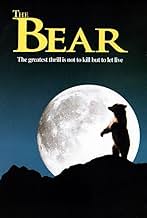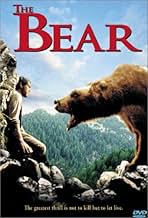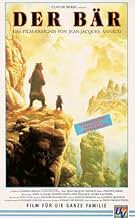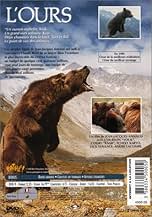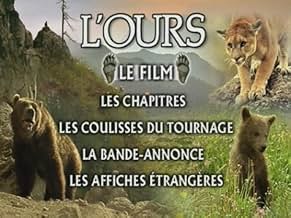NOTE IMDb
7,7/10
20 k
MA NOTE
Une ourse meurt écrasée par un rocher, laissant un orphelin dans l'immensité glacée des montagnes. La boule de poil devra apprendre la vie plus tôt que prévu, s'accrochant à un mâle adulte q... Tout lireUne ourse meurt écrasée par un rocher, laissant un orphelin dans l'immensité glacée des montagnes. La boule de poil devra apprendre la vie plus tôt que prévu, s'accrochant à un mâle adulte qui n'a pas vraiment souhaité ça.Une ourse meurt écrasée par un rocher, laissant un orphelin dans l'immensité glacée des montagnes. La boule de poil devra apprendre la vie plus tôt que prévu, s'accrochant à un mâle adulte qui n'a pas vraiment souhaité ça.
- Réalisation
- Scénario
- Casting principal
- Nommé pour 1 Oscar
- 5 victoires et 11 nominations au total
Avis à la une
I hate Grizzly Bears. I hate them because I'm terrified of them. Nothing in the woods is gonna set you free like confronting a bear (well, maybe the Zodiac killer). Whenever you're out there, away from it all, there is the looming threat of The Bear. He is nature raw; he's a wake-up call, saying, "it's time to prove who you are and where you belong, now!"
Imagine loving a film from the point of view of your worst enemy. Think about feeling empathy and compassion for your most horrible nightmare. That's this film for me.
Sure it helps that the narrator is an innocent child, abandoned in the woods. Sure, he has dreams just like you do. He even chews mushrooms and trips around like you did as a teenager. He learns, he grows up, he faces trials, he is loved and protected.
The Indians say that when you kill an animal, you must respect his living soul. His rights are the same as yours. Maybe you had the edge this time, maybe you live a little longer. But, in the end, you are one in the same. Only the arrogance of man makes you think you're more important. The hunter supplicates because he's out-brawned. It's only later that he realizes that he is The Bear. Maybe not now, or before, but sometime. What would happen if everyone thought of themselves as an integral part of it all? That the trees, the rocks, the animals, the clouds, hell, everything of the earth was impossible to separate from humanity's own lifeforce?
It is rare when a work or art can change a perspective that's been locked in for a lifetime or re-enforced by centuries of civilization. But, for one magical moment, I was The Bear.
Imagine loving a film from the point of view of your worst enemy. Think about feeling empathy and compassion for your most horrible nightmare. That's this film for me.
Sure it helps that the narrator is an innocent child, abandoned in the woods. Sure, he has dreams just like you do. He even chews mushrooms and trips around like you did as a teenager. He learns, he grows up, he faces trials, he is loved and protected.
The Indians say that when you kill an animal, you must respect his living soul. His rights are the same as yours. Maybe you had the edge this time, maybe you live a little longer. But, in the end, you are one in the same. Only the arrogance of man makes you think you're more important. The hunter supplicates because he's out-brawned. It's only later that he realizes that he is The Bear. Maybe not now, or before, but sometime. What would happen if everyone thought of themselves as an integral part of it all? That the trees, the rocks, the animals, the clouds, hell, everything of the earth was impossible to separate from humanity's own lifeforce?
It is rare when a work or art can change a perspective that's been locked in for a lifetime or re-enforced by centuries of civilization. But, for one magical moment, I was The Bear.
At last a movie that seriously attempts to portray the world from a non-human point of view! It's a leap of the imagination that many of us, I'm sure, have never even contemplated. This beautifully-filmed movie, marketed as a kids' film, cannot of course undertake such a task without a few failures here and there; but whatever lapses into anthropomorphism there may be can be readily excused if one compares The Bear with, say, Milo and Otis (cringe).
The story, set in late nineteenth-century British Columbia, revolves around two bears; a young orphan and the huge male who adopts him. Much of the film has no human speech, viewers instead having to interpret the body language and sounds of wild animals. The photography is so impressive and the editing so nicely done that this is a fascinating process, reminding us just how much we as a species have in common with other animals. We can even identify with the bears' diet; they are omnivorous, as are we. Their physical actions and expressions of emotion make a compelling comparison with our own behaviour, and the filmmakers have done their utmost to retain as "natural" a feel as possible to such scenes.
The appearance of human beings, two bear hunters, comes almost as a shock after immersion in the simple world of the bears. The hunters are animals too, but unlike the bears they interact clumsily with the breathtaking wilderness in which they move; their predatory intelligence and use of weaponry have to compensate for their physical vulnerability. They are clearly aliens in an unfriendly environment, though they move as if they were the only creatures of importance within it. Bearskins are piled high in their camp, their little bastion of safety in the untamed wilderness.
These two worlds do of course collide. The hunters, in their arrogance, bite off more than they can chew when a poorly-managed encounter with the male adult bear leads them to pursue a vendetta against him. They capture the young cub to keep the adult in the area, then systematically set out to kill the creature that has caused them so much inconvenience. But the hunters have at last come up against an enemy that seems like the personification of an offended Mother Nature. In an absolutely convincing and spine-chilling scene, one of the hunters comes face to face with the reality of his position in the scheme of things in a manner in which he, and we who watch, will never forget. His teacher is The Bear; the young hunter leaves the mountains a fundamentally changed man. I have never seen the necessity of respect for our fellow creatures more ably communicated.
The movie ends with the focus once more on the young cub, who must find within himself the first glimmerings of the power his adult protector so effortlessly exudes. The humans have gone: the bears live on, their wild world unchanged by their encounter with the strange two-legged creatures that dared to intrude so unwisely into their affairs.
This beautiful and at times awe-inspiring movie is rated as children's viewing, but I would not recommend it for younger viewers. Older children and adults, however, can learn and gain much from this poignant and fascinating film. Hats off to the filmmakers, they have done their subject justice indeed.
The story, set in late nineteenth-century British Columbia, revolves around two bears; a young orphan and the huge male who adopts him. Much of the film has no human speech, viewers instead having to interpret the body language and sounds of wild animals. The photography is so impressive and the editing so nicely done that this is a fascinating process, reminding us just how much we as a species have in common with other animals. We can even identify with the bears' diet; they are omnivorous, as are we. Their physical actions and expressions of emotion make a compelling comparison with our own behaviour, and the filmmakers have done their utmost to retain as "natural" a feel as possible to such scenes.
The appearance of human beings, two bear hunters, comes almost as a shock after immersion in the simple world of the bears. The hunters are animals too, but unlike the bears they interact clumsily with the breathtaking wilderness in which they move; their predatory intelligence and use of weaponry have to compensate for their physical vulnerability. They are clearly aliens in an unfriendly environment, though they move as if they were the only creatures of importance within it. Bearskins are piled high in their camp, their little bastion of safety in the untamed wilderness.
These two worlds do of course collide. The hunters, in their arrogance, bite off more than they can chew when a poorly-managed encounter with the male adult bear leads them to pursue a vendetta against him. They capture the young cub to keep the adult in the area, then systematically set out to kill the creature that has caused them so much inconvenience. But the hunters have at last come up against an enemy that seems like the personification of an offended Mother Nature. In an absolutely convincing and spine-chilling scene, one of the hunters comes face to face with the reality of his position in the scheme of things in a manner in which he, and we who watch, will never forget. His teacher is The Bear; the young hunter leaves the mountains a fundamentally changed man. I have never seen the necessity of respect for our fellow creatures more ably communicated.
The movie ends with the focus once more on the young cub, who must find within himself the first glimmerings of the power his adult protector so effortlessly exudes. The humans have gone: the bears live on, their wild world unchanged by their encounter with the strange two-legged creatures that dared to intrude so unwisely into their affairs.
This beautiful and at times awe-inspiring movie is rated as children's viewing, but I would not recommend it for younger viewers. Older children and adults, however, can learn and gain much from this poignant and fascinating film. Hats off to the filmmakers, they have done their subject justice indeed.
From the first moment when you see the little bear and his mom digging for honey I was entranced with this film. The whole aura of life in the wild- the mountain lions that prey on other animals and the bear is certainly an omnivore! I don't know how the filmmakers got all that great footage but I enjoyed seeing life through the eyes of the orphaned cub. The scenery is breathtaking. The hunters were almost an intrusion in the film, but in the end they helped to bring the story full circle. This film was recommened to me by a man who never reads, he waxed so about this film I had to see it and I agree it is both a nature film and an allegory on life.
10trams98
I saw only a small part of this movie on TV recently but found it compelling enough to spend an hour on the Internet trying to find out its title and then rented it as 'The Bear'.
It was worth the effort. What a refreshing change from the parade of Hollywood block busters. An orphaned bear cub is the star along with an adult Kodiak bear. They are being hunted by two men with guns and dogs in a breathtaking never ending landscape where no dialogue is needed. Appropriately, one of the few lines of dialogue has one of the hunters refer to himself as a "stupid human".
I wondered how on earth some of the shots were achieved but not too much, the story is too compelling. "The Bear" is an enchanting glimpse into a world few people ever witness and a cautionary tale for hunters everywhere.
It was worth the effort. What a refreshing change from the parade of Hollywood block busters. An orphaned bear cub is the star along with an adult Kodiak bear. They are being hunted by two men with guns and dogs in a breathtaking never ending landscape where no dialogue is needed. Appropriately, one of the few lines of dialogue has one of the hunters refer to himself as a "stupid human".
I wondered how on earth some of the shots were achieved but not too much, the story is too compelling. "The Bear" is an enchanting glimpse into a world few people ever witness and a cautionary tale for hunters everywhere.
Almost 20 years later, this remains the best of "animal" movies I've ever seen - where there is little dialog and animals dominate the screen. The amazing photography with the bears, the stunning cinematography overall and the great landscape (British Columbia) all make this a visual treat. Even better, it's an interesting story and has remained that with each of the viewings I've had of this film since discovering it in the mid '90s.
It's a solid adventure story, and the little bear in here is lovable. The "bad guys" (the hunters) aren't really all that bad, either. The bears' performances are fascinating, simply amazing. It must have taken incredible patience to film this movie.
Outside of a couple of "damns," there is no profanity and, I would think, is a great film for any age person to see. Highly recommended.
It's a solid adventure story, and the little bear in here is lovable. The "bad guys" (the hunters) aren't really all that bad, either. The bears' performances are fascinating, simply amazing. It must have taken incredible patience to film this movie.
Outside of a couple of "damns," there is no profanity and, I would think, is a great film for any age person to see. Highly recommended.
Le saviez-vous
- AnecdotesBecause in the wild, male bears usually eat bear cubs if they can, the filmmakers prepared the adult Bart the Bear for the cub by having him play with a teddy bear the size and fur color of the cub. When the trainers felt he was ready, he was introduced to the cub and he greeted the cub affectionately.
- GaffesAfter the bear attacks the hunters' horses, and one of the hunters has tracked down his hurt horse and has it cornered in a small rock enclosure, rocks are visible being thrown from the left side of the shot to stir the horse up.
- ConnexionsFeatured in Motormouth: Épisode #2.3 (1989)
- Bandes originalesEnd Title Theme
Music adapted from "June: Barcarolle"
by Pyotr Ilyich Tchaikovsky (uncredited), from "The Seasons"
Played by Orchestra
Meilleurs choix
Connectez-vous pour évaluer et suivre la liste de favoris afin de recevoir des recommandations personnalisées
- How long is The Bear?Alimenté par Alexa
Détails
Box-office
- Montant brut aux États-Unis et au Canada
- 31 753 898 $US
- Week-end de sortie aux États-Unis et au Canada
- 3 676 530 $US
- 29 oct. 1989
- Montant brut mondial
- 31 753 898 $US
- Durée
- 1h 36min(96 min)
- Couleur
- Rapport de forme
- 2.35 : 1
Contribuer à cette page
Suggérer une modification ou ajouter du contenu manquant

![Regarder Bande-annonce [OV]](https://m.media-amazon.com/images/M/MV5BZTE0ODk2YTgtMWVkYy00YTRiLTllOTctODQwYjFlNTAwNTk4XkEyXkFqcGdeQXRyYW5zY29kZS13b3JrZmxvdw@@._V1_QL75_UX500_CR0)





